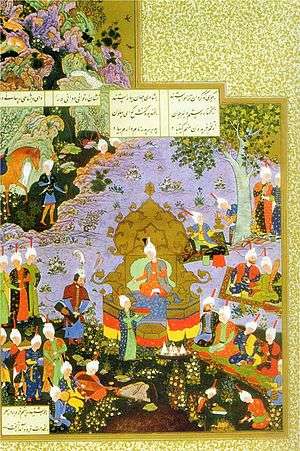Mazandaran (Shahnameh)
Mâzandarân[1][2][3] (Persian: مازندران) is an important place in the Shahnameh, the national epic of Greater Iran. It should not be confused with the modern Mazandaran Province in northern Iran, formerly known as Tabarestan.[2] Besides the Shahnameh, there are also references to Mazandaran in the Avesta.[2]
| Mazndaran | |
|---|---|
| Shahnameh Countries | |
| Type | Ancient Country |
| king | Div-e Sepid |

It is not clear where Mazandaran was located – various places have been suggested. Some scholars believe that Mazandaran was a region in India,[3] others believe that Mazandaran is in the Levant or Egypt,[2] but there is no consensus between scholars.
In the Shahnameh
In the Shahnameh, Mazandaran is the land of great Divs (demons). It is such a horrible place that no Shah of Iran dared to go there to conquer the land. One day, a Div came to Kai Kavus to read a poem for him to describe the beauties of Mazandaran. Being impressed by the Div's description, Kai Kavus, who is an irrational and unwise man, decides to conquer Mazandaran. Everyone is opposed to this decision, because even great kings such as Jamshid and Fereydun wouldn't try to conquer the land. Nonetheless, Kai Kavus insists upon it. He goes there, but is defeated and imprisoned by the Divs of the area. He and two-thirds of his army are blinded by the Divs. He writes a letter to Zāl to ask him to come and rescue him, but Zāl is old and can't go. Instead, he sends Rostam, who is a child. Rostam has to pass Haft Khan in order to get to Mazandaran.
Prior to the above, there are some references to Mazandaran, in the story of Zāl and Rudaba. It seems that Sām, the grandfather of Rostam, had conquered Mazandaran at the time of Manuchehr.[2]
Mazandaran was inhabited by a population that was different from other Iranians. They didn't believe in God, and instead they were magicians; and for this reason, they could not be defeated by man's power, only God's power could defeat them.[3]
References
- "Mazndaran in Shahnameh". Retrieved 15 February 2016.
- "Mazandaran and Alborz in Shahnameh". Retrieved 15 February 2016.
- "The dream of conquering Mazandaran". Retrieved 15 February 2016.
Sources
- Ferdowsi Shahnameh. From the Moscow version. Mohammed Publishing. ISBN 964-5566-35-5
_MET_sf20-120-244.jpg)


.png)
_of_Shah_Tahmasp_MET_DP107154.jpg)